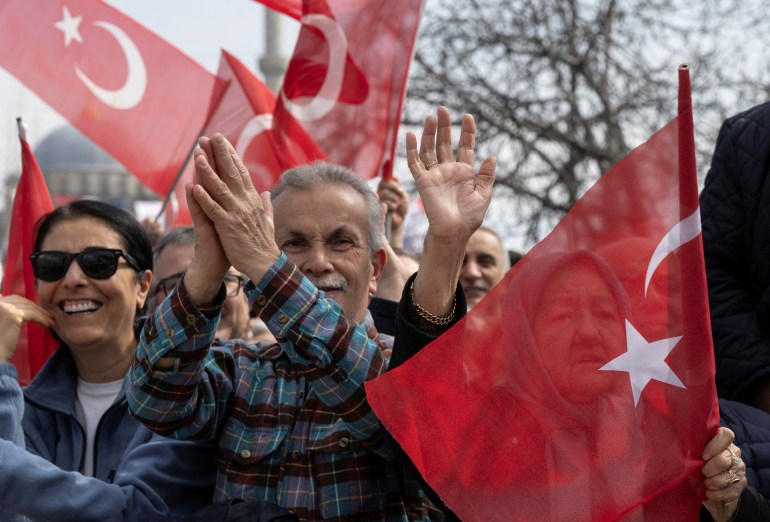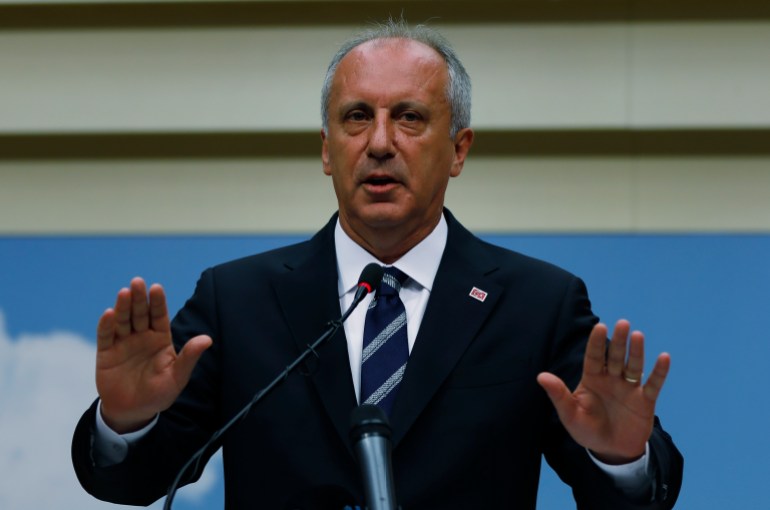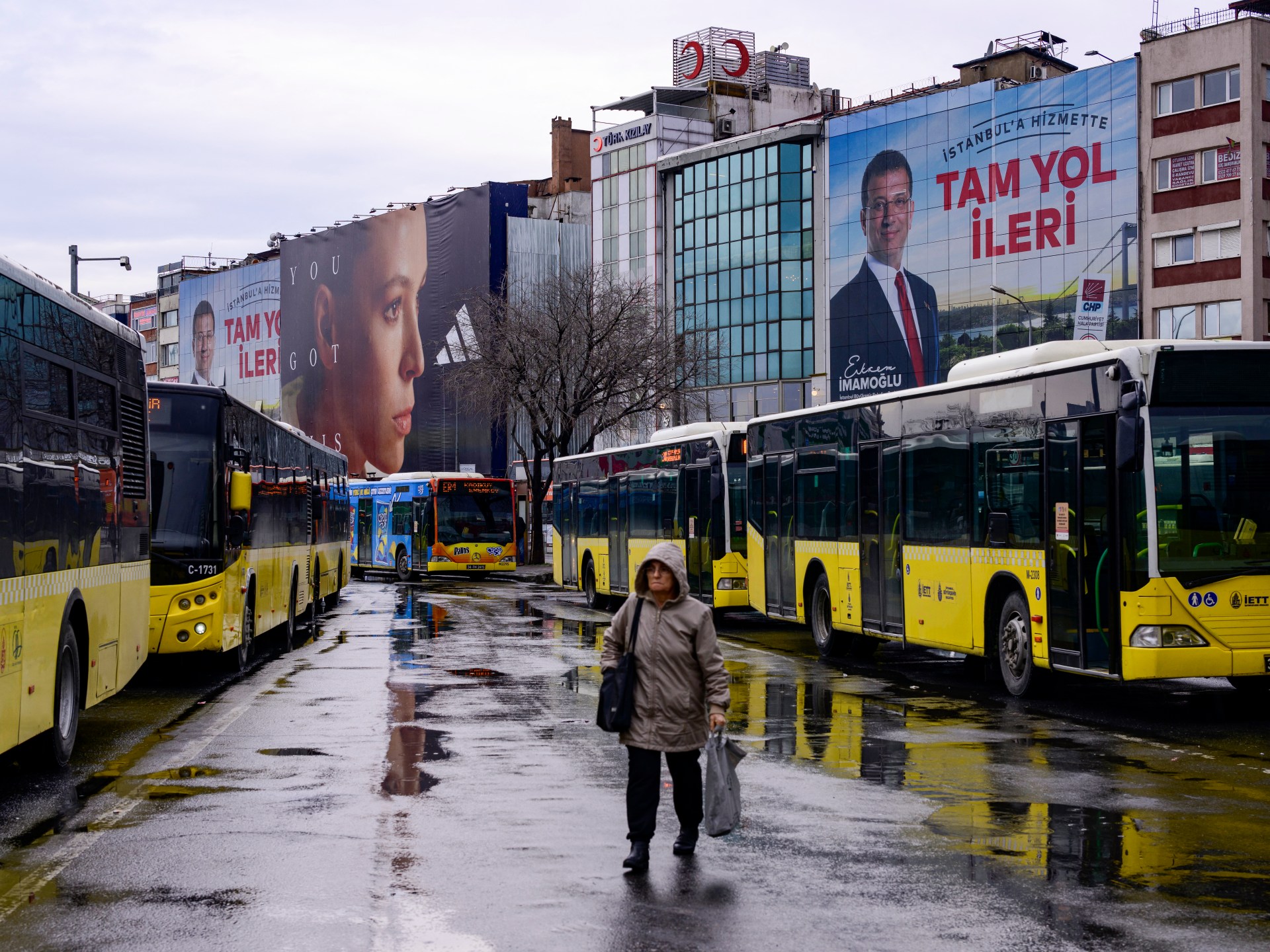Istanbul, Turkey – As nationwide local elections approach on March 31, there are concerns in Turkey about the growing threat of disinformation and fake media created through artificial intelligence.
Earlier this year, a video spread across social media purportedly showing Istanbul’s opposition mayor praising President Recep Tayyip Erdogan’s ruling Justice and Development Party (AK Party).
Ekrem Imamoglu, of the Republican People’s Party (CHP), is seen in the video commending the “great steps” taken in public transport projects when the AK Party controlled Istanbul.
While the video was widely discredited due to the substance of Imamoglu’s “comments”, it raised fears about media manipulation in an election where the AK Party is trying to retake cities won by the opposition in 2019.
Political scandals over “leaked” recordings are nothing new in Turkey.
In 2010, CHP leader Deniz Baykal stood down following the publication of a sex tape online.
Four years later, then-Prime Minister Erdogan condemned an audio recording that suggested his involvement in corruption, saying it was fabricated.
Deepfake vs cheap fake
Fake videos and images present a “huge threat” in the upcoming election, Emre Ilkan Saklica, director of fact-checking project Teyit (“verification” or “collaboration” in Turkish), said.
The spread of social media has seen a growth in content denounced as fake.
“It doesn’t take a long time for content to … spread on social media,” he said. “A claim made from an individual account can suddenly become widespread and find its place in the mainstream.”
Apart from the Imamoglu video, there have been several other incidents in the run-up to the elections, in which candidates are competing for positions ranging from metropolitan mayor to village representative.
The Workers’ Party of Turkey announced on Sunday that it was withdrawing the mayoral candidacy of former footballer Gokhan Zan in Hatay, one of the southern provinces hit by last year’s earthquakes.
The move came amid reports of a recording in which Zan allegedly discussed bribes and a possible job with state-run broadcaster TRT in return for running against Hatay’s incumbent CHP mayor.
Zan later filed a criminal complaint claiming he had been subjected to “threats and blackmail” and saying the recording had been created through AI.
Saklica said that “cheap fake” videos were more prevalent than sophisticated AI-created content, however.
Last week, video footage circulated of CHP officials in Istanbul counting bundles of cash, hinting at corruption within the opposition.
The party said the video was from 2019, when staff were depositing cash with a lawyer handling the purchase of the CHP’s office.

“Ahead of the 2023 general elections, many people were of the opinion that deepfake, AI-generated videos were the primary threat,” Saklica said.
“However, beyond these technologies, images or videos that are called cheap fakes can be produced in just a few minutes and can become widespread much more easily in Turkey.”
‘Sticks like chewing gum’
Addressing this month’s election, Ejder Batur, deputy chairman of the AK Party in Istanbul, accused the CHP of creating “perceptions … with advertisements and disinformation” to mislead the public about its record in Istanbul over the last five years.
He added that the public would not respond to disinformation.
When the Turkish parliament passed a law in October 2022 to fight disinformation, critics said the bill, which criminalised “disseminating false information” with a prison sentence of up to three years, would stifle access to information and deepen online censorship.
The government and its supporters argued that it was essential to restrict misleading and possibly malevolent information spreading.

“We are faced with a type of disinformation that aims to influence the election results,” Oguzhan Bilgin, a TRT board member and director of the Istanbul-based Diplomacy Foundation, said.
He pointed to the withdrawal of one of four presidential candidates in last May’s election as an example of disinformation directly affecting the democratic process.
Muharrem Ince pulled out three days before the vote, citing fake sex pictures posted online as one of his reasons for quitting.
However, Bilgin conceded that the impact of disinformation was “highly debatable”.
While opposition figures have accused the AK Party of being behind fake content such as the Imamoglu video, the method by which such disinformation is spread often makes it difficult to identify its origin.
A video of the CHP presidential candidate seemingly being endorsed by Kurdish armed leaders was shown at AK Party rallies in the lead-up to last year’s presidential election – but President Erdogan acknowledged it was “the product of the quick wits of our young people”.
Amid the murk of politics, groups like Teyit face an uphill battle, according to Saklica.
“Since the spread of misinformation is faster than correct information, it is very difficult to correct misinformation that sticks to the minds of many users like chewing gum,” he said.


